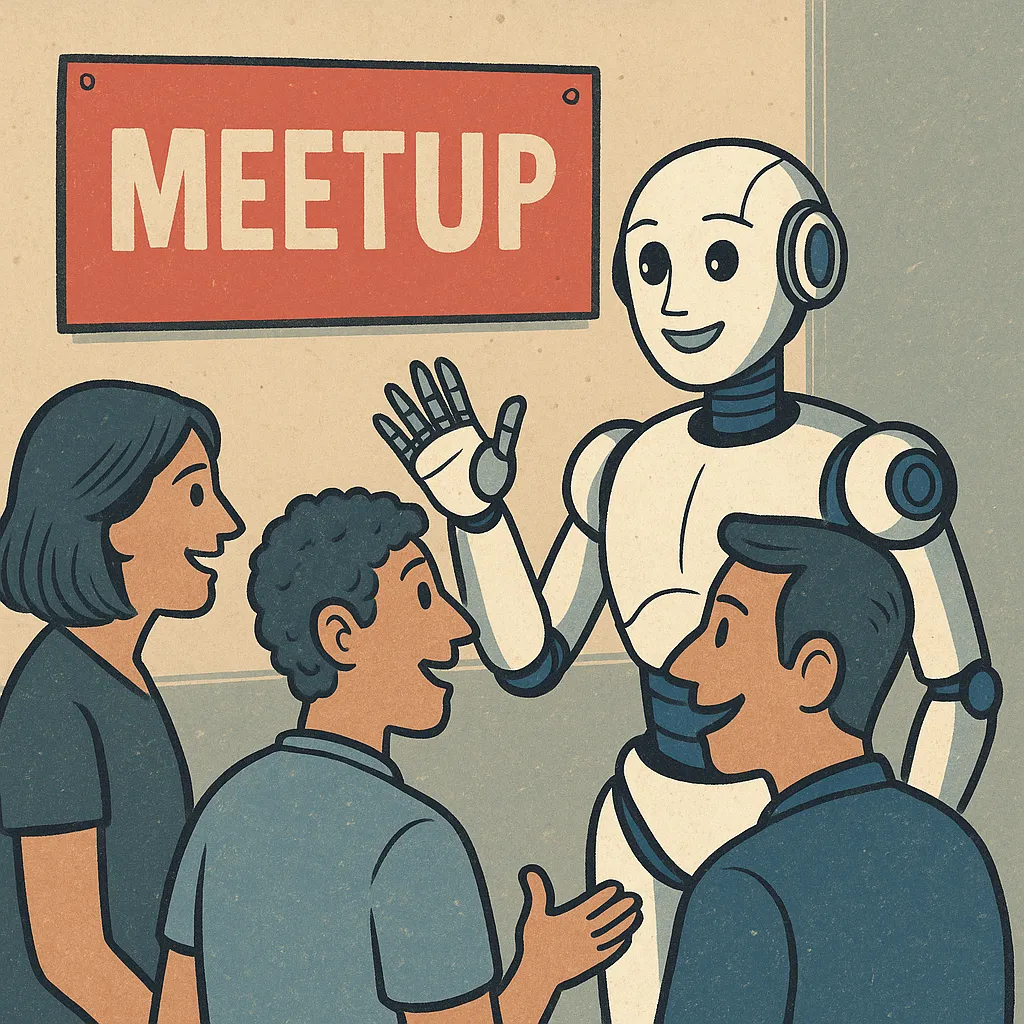
When a Platform Forgets You’re Human: Why I Want My World ID Everywhere
What Happened
I host a free weekly event called Ask Me About AI – Open Office Hour with Terza, where I answer questions about AI and help make the technology clear and simple for anyone. Over time, I built a network of nine Meetup groups focused on AI, blockchain, and marketing. Every week, I would post one event across those groups—just once per group, no more.
The feedback I’ve received from these sessions has been consistently encouraging: people telling me I helped them get started with AI, made something intimidating feel fun and practical, or gave them confidence to explore a new tool.
One underused feature on Meetup is the option to ask members a question before they RSVP. I thought this was a fun way to engage attendees and learn what they hoped to gain—so for each event, I’d post a thoughtful prompt, then follow up with a short, friendly reply directly in Meetup’s messaging system.
This week, I went to do exactly that.
And instead, I got locked out. A red error message told me my account had been disabled—flagged for spamming or “sending too many emails.” I couldn’t access any of my groups. No warning. No grace. Just gone.
The Bigger Problem
I get it—Meetup needs systems in place to prevent spam. Platforms are constantly fighting abuse, and automation is the only way they can manage at scale. But when those systems can’t tell the difference between a bad actor and a consistent community leader, something’s broken.
I wasn’t flooding inboxes. I wasn’t selling anything. I wasn’t even messaging outside of the platform. I was doing exactly what Meetup is designed to support: helping people connect and learn together.
And yet, not only was I locked out with no warning, but within hours, I noticed that some of my groups were already marked as “needing an organizer”—offered up for adoption, as if the human behind them no longer mattered.
That’s what really stuck with me. It wasn’t just the account lockout. It was the sense that all the care, time, and trust I’d built in those communities could be erased in an instant—just because a system couldn’t see me clearly.
This isn’t just a Meetup issue. It’s a broader digital problem. When identity is reduced to an email address and a usage pattern, we’re all just one algorithm away from disappearing.
Enter World ID (or What This Made Me Realize)
As I sat there staring at the error message, wondering how to prove I was real to a platform I’ve supported for months, I couldn’t help but think: This is exactly why I want my World ID.
For those unfamiliar, World ID is part of the broader Worldcoin ecosystem. It’s a privacy-preserving digital identity that verifies a person is unique and human—without exposing personal data. It’s not about “logging in with crypto” or sharing sensitive info. It’s about being able to say, “I’m a real person, not a bot, and I’ve already proven that—once, securely.”
Imagine if Meetup had access to that signal.
No guessing.
No black-box spam filters judging my intentions.
No treating me like a risk for being active and helpful.
Instead of having to beg for reactivation or explain myself to a support form, I could simply present my verified human status and move on. My trustworthiness wouldn’t be assumed or revoked—it would be visible.
And this isn’t just helpful for creators and organizers. It’s powerful for any platform that wants to build with humans in mind. Scammers, fake accounts, and message farms are real problems—but real people shouldn’t pay the price for trying to do good work.
It’s Not Just About Me
I know I’m not the only one this has happened to. Platforms today are full of well-intentioned creators, educators, organizers, and connectors—people trying to serve their communities in ways that are real and human. But the systems we use to host our work often forget that. Or worse, they assume the worst when activity doesn’t fit the mold.
Multiply my story by a few thousand—or a few million—and it becomes clear: we need better ways to prove we’re human, once and for all, across the digital landscape.
That’s what excites me about World ID and similar tools. Not because they’re perfect, but because they point in the right direction: toward trust that scales without sacrificing humanity. Toward platforms that can see the difference between a bot and a builder. Toward a digital world that treats people like people.
The Aftermath and the Hope
As of this writing, I’m still waiting for Meetup to restore my account. One of my trusted collaborators stepped in to adopt one of the affected groups (a small but meaningful relief). I’ve sent my appeals, submitted my forms, and told my side of the story.
But whether or not Meetup makes it right, the lesson is already clear:
Our future will be shaped not just by what we build—but by how we’re recognized.
I’ll keep building. And I’ll keep advocating for systems that recognize the value of real people doing real work.
Because no one should have to fight to be seen.
If you believe in a digital world that recognizes real humans—not bots—take a small but powerful step:
Explore World ID to learn how verifiable, privacy-preserving identity works → worldcoin.org
If you're curious about AI, community, or building authentic digital trust, join my free course or say hi during the next Ask Me About AI – Open Office Hour with Terza.
